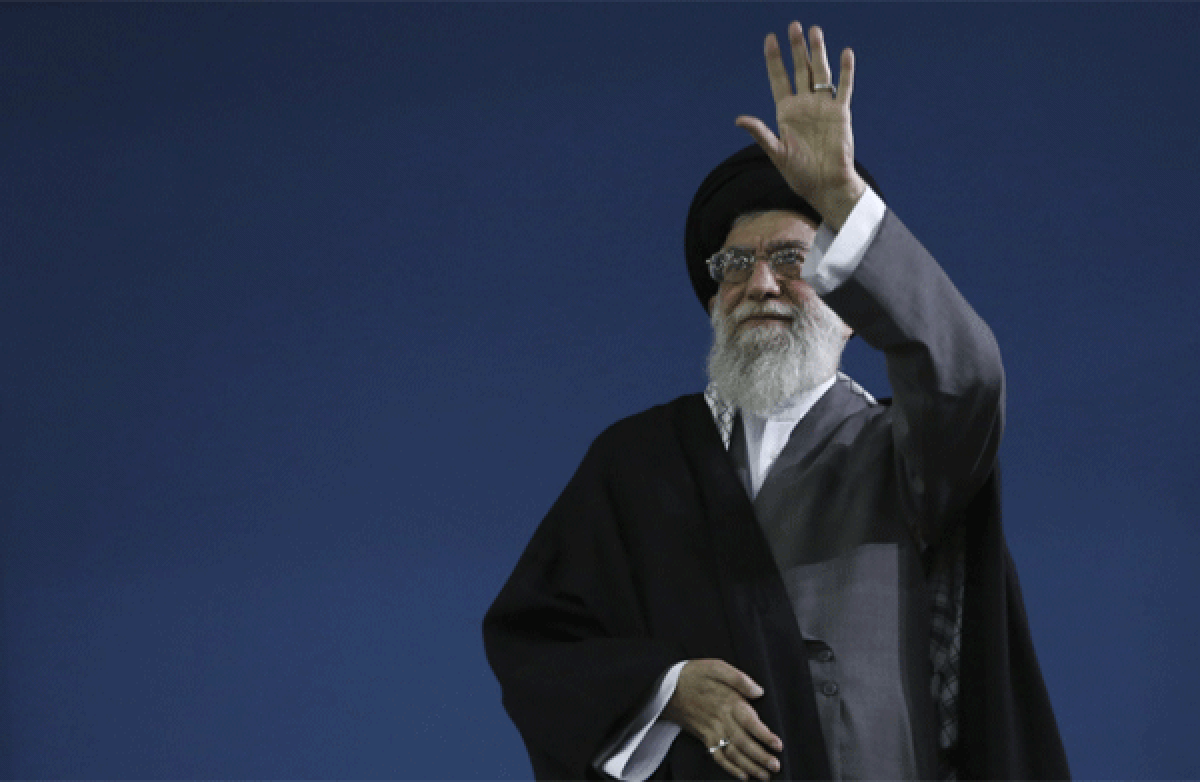Why Iran says no

- Share via
Iran’s supreme leader, Ayatollah Ali Khamenei, has been doubling down on his hard-line message that all but rules out the possibility of direct talks with the United States. In the lead-up to the latest round of the so-called six-party talks on Iran’s nuclear program, which begin in Kazakhstan on Tuesday, Khamenei enumerated his reasons in a Feb. 16 speech.
Calling Western suspicions of Iran’s nuclear program “illogical,” “disingenuous” and “insulting,” Khamenei characterized the latest efforts by the Obama administration to negotiate directly with Iran as “a marketing ploy” designed to convince Islamic countries around the world that if the Islamic Republic, with its long history of resistance and endurance, finally relented and negotiated, then what hope would they have standing up against the West. The real aim of Western powers, Khamenei declared, was not good-faith negotiations but forcing Iran’s “surrender.”
It would be tempting to interpret Khamenei’s public interjections as either a negotiating tactic designed to demonstrate Iran’s resolve in the face of punishing sanctions and virtual isolation from the international community, or a signal to the United States to present a more concrete and authentic set of inducements as a precondition for direct talks on the nuclear issue.
Alas, it is neither.
Reaching a lasting deal with Khamenei has never been about Iran’s nuclear program but rather the political legitimacy — and thereby survival — of the Islamic regime.
Ever since his accession to power in 1989, Khamenei’s public pronouncements regarding Iran’s relations with the West have oscillated between expressions of radical defiance and grudging accommodation. Mindful of threats to his power by rival conservative and reformist factions, Khamenei has nearly always undermined efforts by any one of these groups to resolve Iran’s long-standing disputes with Western powers, often publicly scolding them for having jeopardized the ideals of the Islamic Republic. (Radical Mahmoud Ahmadinejad, reformist Mohammad Khatami and pragmatist Ayatollah Ali Akbar Hashemi Rafsanjani have each been targeted during their presidencies.)
On those rare occasions when he has appeared responsive to direct appeals for engagement by Western leaders — as when he was courted by President Obama publicly in his first inaugural address and through private correspondence — Khamenei has either downplayed the significance of such overtures (“Actions speak louder than words,” he retorted after Obama’s inauguration) or denounced them as disingenu-
ous attempts to bring Iran to its knees. As is his custom, he is neither specific about the sources of his discontent nor particularly clear about even the outlines of a possible resolution he would deem favorable.
This has left Iran’s otherwise able diplomatic corps impotent and increasingly incoherent at crucial international gatherings, as was evident at the recent international security meeting in Munich, Germany, where Iranian Foreign Minister Ali Akbar Salehi responded in kind to Vice President Joe Biden’s conciliatory, pro-engagement speech.
But of course the real source of Khamenei’s seemingly rejectionist attitude is not the bullying approach of the West toward Iran’s nuclear program. After all, he also routinely undermined attempts at rapprochement between the Khatami and Clinton administrations at a time when worries about Iran’s nuclear program did not exist. Rather, he is increasingly paranoid about the implications of a “grand bargain” with the United States for his privileged position as the chief interpreter of the ideals of the Islamic Republic.
Simply put, normalization of relations between Iran and the United States would deprive Khamenei and the deeply invested cohort of radical ideologues around him of a powerful justification for their arbitrary rule.
Continued enmity with the United States has time and again proved to be a convenient excuse for silencing the reformist opposition (as in the case of the 2009 Iranian presidential election, which has simply become known as “the sedition”) and managing the increasingly fragmented conservative establishment.
The difficult dilemma facing the Obama administration, therefore, is not simply one
concerning the rights or responsibilities of Iran under the terms of the Nuclear Nonproliferation Treaty. It is how to address and navigate the crisis of political legitimacy haunting Khamenei and his radical base of power. The implementation of an unprecedented regime of economic and political sanctions against Iran has been a godsend to Khamenei, because it presents him with a tangible set of grievances against American “arrogance” and “hypocrisy.”
But will it result in meaningful concessions by Khamenei on the nuclear front?
Khamenei ended his latest speech with a telling observation. “The sanctions,” he said, “did not in fact put any distance between the people and the Islamic Republic. They merely proved the point that belief in Islam and resilient leadership can help solve any problems. Surrender to the enemies [of the Islamic Republic] will not solve anything.”
On Thursday, the International Atomic Energy Agency reported that Iran had begun work on installing advanced centrifuge machines for enriching uranium at its Natanz nuclear facility.
Hussein Banai is an assistant professor of diplomacy and world affairs at Occidental College. He is coauthor of “Becoming Enemies: U.S.-Iran Relations and the Iran-Iraq War, 1979-1988.”
More to Read
A cure for the common opinion
Get thought-provoking perspectives with our weekly newsletter.
You may occasionally receive promotional content from the Los Angeles Times.









